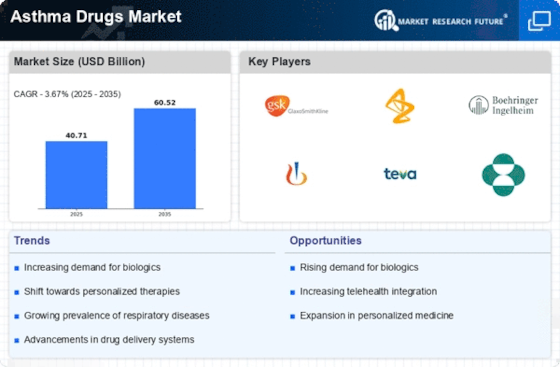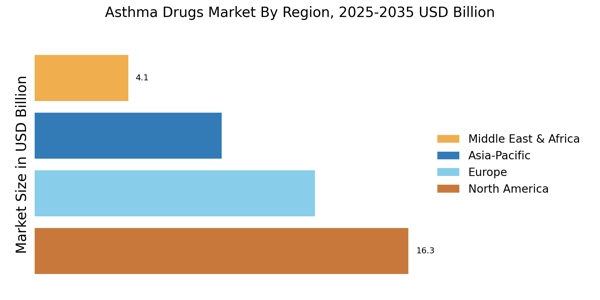Growing Prevalence of Asthma
The increasing prevalence of asthma worldwide is a primary driver for the Asthma Drugs Market. According to recent estimates, approximately 300 million individuals are affected by asthma, with numbers expected to rise due to urbanization and environmental factors. This growing patient population necessitates the development and availability of effective asthma medications. The rising incidence of asthma exacerbations further emphasizes the need for innovative treatment options. As healthcare systems strive to manage this chronic condition, the demand for asthma drugs is likely to increase, thereby propelling the market forward. The Asthma Drugs Market is thus positioned to expand as pharmaceutical companies invest in research and development to address the needs of this expanding demographic.
Rising Awareness and Education
Rising awareness and education regarding asthma management are pivotal in shaping the Asthma Drugs Market. Increased public health campaigns and educational initiatives have led to a better understanding of asthma triggers and management strategies. This heightened awareness encourages patients to seek medical advice and adhere to prescribed treatments, thereby increasing the demand for asthma medications. Additionally, healthcare professionals are becoming more knowledgeable about the latest treatment options, which further supports the market's growth. As patients become more proactive in managing their condition, the Asthma Drugs Market is likely to benefit from this trend, leading to improved health outcomes and increased medication utilization.
Advancements in Drug Development
Recent advancements in drug development are significantly influencing the Asthma Drugs Market. The emergence of biologic therapies, which target specific pathways involved in asthma pathophysiology, has transformed treatment paradigms. These therapies, such as monoclonal antibodies, have shown promising results in clinical trials, leading to their increased adoption. Furthermore, the development of novel inhalation devices and formulations enhances drug delivery and patient compliance. The market is witnessing a shift towards personalized medicine, where treatments are tailored to individual patient profiles. This trend is expected to drive growth in the Asthma Drugs Market as healthcare providers seek more effective and targeted therapies for asthma management.
Regulatory Support and Approvals
Regulatory support and streamlined approval processes are crucial drivers for the Asthma Drugs Market. Regulatory agencies are increasingly recognizing the need for expedited pathways for innovative asthma therapies, which can significantly reduce the time to market. This supportive environment encourages pharmaceutical companies to invest in research and development, leading to a more diverse range of treatment options for patients. The approval of new drugs and inhalation devices not only enhances competition but also provides patients with more choices. As regulatory frameworks evolve to accommodate advancements in asthma treatment, the Asthma Drugs Market is poised for growth, with a wider array of effective therapies becoming available.
Integration of Technology in Treatment
The integration of technology in asthma treatment is emerging as a key driver for the Asthma Drugs Market. Digital health solutions, such as mobile applications and telemedicine, are facilitating better disease management and patient engagement. These technologies enable patients to monitor their symptoms, medication adherence, and triggers in real-time, leading to improved health outcomes. Furthermore, the use of smart inhalers equipped with sensors is gaining traction, providing valuable data to both patients and healthcare providers. This technological advancement not only enhances treatment efficacy but also fosters a more proactive approach to asthma management. As technology continues to evolve, the Asthma Drugs Market is likely to experience significant growth, driven by the demand for innovative solutions that improve patient care.

















